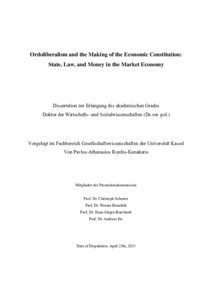| dc.date.accessioned | 2024-04-05T13:00:06Z | |
| dc.date.available | 2024-04-05T13:00:06Z | |
| dc.date.issued | 2023 | |
| dc.identifier | doi:10.17170/kobra-202403209818 | |
| dc.identifier.uri | http://hdl.handle.net/123456789/15620 | |
| dc.language.iso | eng | |
| dc.rights | Attribution-NonCommercial-NoDerivatives 4.0 International | * |
| dc.rights.uri | http://creativecommons.org/licenses/by-nc-nd/4.0/ | * |
| dc.subject.ddc | 320 | |
| dc.title | Ordoliberalism and the Making of the Economic Constitution: State, Law, and Money in the Market Economy | eng |
| dc.type | Dissertation | |
| dcterms.abstract | The aim of my research is to explore the political economy of ordoliberalism in its historical trajectory. Beginning from the years of its inception during the interwar period, the dissertation focuses on the specific conditions and political economy of the Weimar Republic as the framework within which the ordoliberal framework was developed. Moving on to the postwar period, the dissertation examines the attempts of operationalization of the ordoliberal framework within the context of West Germany and the social market economy. Having analysed the success and contradictions that this attempt brought out, the dissertation proceeds by exploring the ways in which the experiment of the social market economy re-ignited the international character of the ordoliberal framework and its reconceptualization within the context of the process of European integration. Working through the wider framework of the Bretton Woods regime, its political economy and contradictions, the dissertation proceeds by inspecting the ways in which ordoliberals positioned themselves in relation to Bretton Woods at a time when the social market economy was showing signs of exhaustion. The eventual collapse of Bretton Woods caused a reconsideration of European integration, a process concomitant with the rise of monetarism and the return of authoritarian liberalism. The final part of the dissertation examines the specific role of the ordoliberal framework in the process of the creation of the European Monetary Union, as well as the constitutional and political economy challenges that the Eurozone crisis brought to the foreground. | eng |
| dcterms.accessRights | open access | |
| dcterms.creator | Roufos-Kanakaris, Pavlos-Athanasios | |
| dcterms.dateAccepted | 2023-04-25 | |
| dcterms.extent | 384 Seiten | |
| dc.contributor.corporatename | Kassel, Universität Kassel, Fachbereich Gesellschaftswissenschaften | |
| dc.contributor.referee | Scherrer Christoph (Prof. Dr.) | |
| dc.contributor.referee | Bonefeld, Werner (Prof. Dr.) | |
| dc.contributor.referee | Burchardt, Hans-Jürgen (Prof. Dr.) | |
| dc.contributor.referee | Eis, Andreas (Prof. Dr.) | |
| dc.subject.swd | Ordoliberalismus | ger |
| dc.subject.swd | Wirtschaftsverfassung | ger |
| dc.subject.swd | Marktwirtschaft | ger |
| dc.subject.swd | Bretton-Woods-System | ger |
| dc.subject.swd | Recht | ger |
| dc.subject.swd | Geschichte 1920-2020 | ger |
| dc.type.version | publishedVersion | |
| kup.iskup | false | |
| ubks.epflicht | true | |


